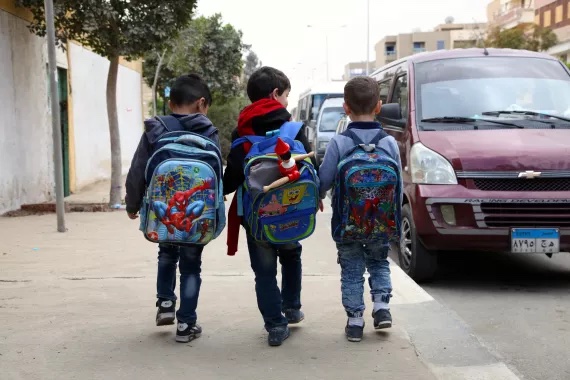Dangerous heat threatened people around the globe during the summer of 2023. According to NASA, the summer of 2023 was the hottest on record, and the consequences have been disastrous to people and the environment alike.[1] Such heat exacerbated wildfires across Canada and Hawaii, and contributed to deadly heat waves in places such as Arizona, where daily temperatures reached triple digits.[2] Across Europe and Asia, the climb in the climate’s temperature led to other extreme weather events, more specifically flooding from heavy rainfall.[3] The trend of rising temperatures over the past decade is driven by human emission of greenhouse gasses, or anthropogenic climate change.[4] The failure to curb emissions is costing people their lives and destroying ecosystems. The dangers of the climate crisis that scientists and health officials have repeatedly warned of are coming to fruition.[5] While many public health officials call for people to stay indoors, the ultimate solution to the heat will not come from air conditioning, as it contributes to the climate crisis. Across the world, people are filing claims against their governments to curb their carbon emissions to stop the warming of the planet.[6] The basis of their claims is that compliance with the climate crisis is a human right .[7] It is estimated that nearly 61,000 people in Europe alone died in the summer of 2023 due to the heat.[8] Thousands will continue to be impacted if governments do not take action to prevent extreme weather events. The human rights approach to climate justice may prove to be transformative for communities across the world.
The Issue – Health and Heat
The impact on peoples’ health from extreme heat events cannot be understated. It is one of the deadliest weather hazards, particularly in the United States.[9] The rate at which people are dying from heat is increasing exponentially – in the US alone, the average rate of heat-related deaths has increased by 95 percent since 2010.[10] Heat can cause a variety of illnesses such as heat exhaustion and, at worst, a heat stroke.[11] Exposure to high temperatures for an extended amount of time can have long lasting impact on one’s cardiovascular health, which can lead to an increased risk of heart attacks.[12] Pollutants, such as ozone, also form faster in the heat, which can make it difficult to breathe and cause respiratory issues.[13] In June 2023, the heat trapped in the smoke and debris from wildfires, rendering city skies across Canada and the US a smoky orange haze for nearly a week.[14] The elderly and individuals who work outside, have pre-existing medical conditions, or lack of access to air conditioning are most at risk for negative health outcomes.[15] People living in cities are also adversely impacted due to the higher rate of heat retaining surfaces, such as asphalt and pavement, and limited greenspaces.[16] When one’s health is negatively impacted by the heat, their lives may be completely uprooted, as it can affect one’s ability to work, travel, and study.[17] In this way, climate change is a dangerous catalyst for negative health and social outcomes.
The Paradox of Air Conditioning
To protect people from the heat, public officials, such as the Centers for Disease Control (“CDC”) in the United States, repeatedly recommend staying indoors with air-conditioning to stay .[18] The issue with air conditioning is that it is merely a band-aid solution that does not work towards resolving the underlying issue: climate change .[19] Increasing reliance on air-conditioning is also inaccessible, in addition to being short-term. Only 12 percent of India’s population of 1.4 million people had air-conditioning during the 2023 heat wave, and such reliance on the power grid led to outages.[20] Even those who do have access may lose it due to overwhelmed energy grid as Texans did this summer, with six power plants going offline during a record setting heat wave.[21] Two years ago in 2021, hundreds of people died in Portland in public housing without AC units when the heat rocketed to 116 degrees Fahrenheit.[22]
Despite the growing need for cool indoor air, tenants in the United States have no federal right to air conditioning as they do for heating.[23] Moreover, people of color in the US are disproportionately impacted, as their communities are more likely to have fewer green spaces and more asphalt.[24] In New York City, half of the heat-related deaths were Black residents, despite being only 22 percent of the population.[25] The rise in these preventable deaths underscores the huge gap in access to cool air. Air conditioning remains a luxury, rather than a right. For these reasons, air conditioning alone as a solution is currently inequitable as the climate crisis continues.
As a result of such inequities, people are dying entirely preventable deaths in the US and abroad. Three billion people live in the hottest parts of the planet, and only eight percent of them have ACs, according to the International Energy Agency (“IEA”).[26] Amongst these countries, are not evenly distributed, again highlighting the lack of accessibility.[27] Air conditioning is a commodity that is inequitably distributed to those who can afford it, as high energy bills can prevent people from using their AC even if they have a unit.[28]
Despite being a short-term solution, air conditioning is a necessity in such heat. In their current state of production, however, ACs are also a contributor to carbon emissions and will only worsen the .[29] Many ACs use potent refrigerants, such as hydrofluorocarbons (“HFCs”), that are up to 12,000 times more powerful in trapping heat than carbon dioxide.[30] The Environmental Protection Agency (“EPA”) estimates that the use of HFCs in ACs could raise the global temperature by a half degree Celsius, which would further environmental destruction.[31] Climate change is also driving up the sales of ACs, with the IEA estimating the number of air conditioners currently in regulation will triple by 2050.[32] Currently, nearly 135 million ACs are sold worldwide every year.[33] Therefore, phasing out HFCs and transitioning to clean energy in the global stock of ACs will be critical in curbing emissions and keeping people cool.[34] More than 137 nations have ratified the Kigali Amendment, a 2016 agreement to phase out such chemicals by 85 percent before 2050.[35] The US ratified this agreement in 2022.[36] This follows President Biden’s Executive Order 14057, or the Federal Sustainability Plan, to cut the nation’s emissions in half by 2030, in accordance with the Paris Agreement.[37] This will ultimately alleviate the issue of climate change and the burdens it places on people and the planet’s health.
As climate change continues to threaten human livelihood, communities are taking legal action to get their governments to enforce regulations that substantially reduce emissions and prevent environmental degradation.[38] Such suits are setting a new precedent in which citizens can use a human rights law to challenge climate change and the policies that enable it.[39]
Health as a Human Right through the Lens of the Climate Crisis
The KlimaSeniorinnen Schweiz – Senior Women for Climate Protection Switzerland
“I used to love summer – and now I fear it,” shares one climate activist behind the landmark human rights lawsuit.[40] She is part of a group of over 2,400 Swiss women, called KlimaSeniorinnen Schweiz.[41] These women filed suit against the Swiss government in the European Court of Human Rights court for not protecting from the dangerous heat of 2023 due to their climate policies.[42] Over 61,000 people died due to the heat waves across Europe, and a majority of them were women over the age of 80.[43] Sixty percent of the heat-related deaths in Switzerland were a result of climate change according to the University of Bern.[44] Of this 60 percent, older women had the highest mortality rate.[45] This case is part of a growing trend to file climate cases on human rights grounds, as the climate crisis continues to cause health issues and exacerbate existing health conditions for vulnerable populations.[46] Four plaintiffs testified to having heart and respiratory diseases that puts them at high risk of fatality during heat waves.[47] They argue that the Swiss government violated their right to life and health under Articles 2 and 8 of the European Human Rights Convention.[48] The government did so by failing to prevent the global temperature from rising 2 degrees Celsius, which is the tipping point scientists have marked as a point of no return in terms of environmental disaster.[49] Though the outcome of the case is likely not to be decided before 2024, similar cases continue to come before the European Court of Human Rights.[50] The decision in the KlimaSeniorinnen Schweiz is likely to determine the findings of the subsequent cases.
Torres Strait Islanders’ Human Rights Claim against Australia
Other cases abroad point to a potential victory in Europe. In September 2022, the United Nations Human Rights Committee (“UNHRC”) found that Australia breached the rights of Torres Strait Islanders due to their failure to address climate change.[51] The plaintiffs are Indigenous people from the Torres Strait Islands and are amongst the most vulnerable to climate change due to the geography of the island.[52] The impact of climate change has rendered parts of the islands nearly uninhabitable, as it threatens the coastal ecosystems and resources.[53] This uproots both the livelihoods and the culture of the Indigenous Torres Strait Island community.[54] Flooding is eroding the shoreline, and frequent cyclones due to climate change have only made the issue worse.[55] Such environmental degradation has had a significant impact on everyday life by placing strain on infrastructure, increasing heat related illnesses, and disrupting social, economic, and cultural practices.[56] This is most likely due to Australia being a leading contributor to carbon emissions.[57]
Similar to the KlimaSeniorinnen Schweiz, the Torres Strait Islanders argue that their government’s failure to address climate change has detrimentally impacted their right to life with dignity.[58] This right is protected under the International Covenant on Civil and Political Rights (“ICCPR”), which Australia has ratified.[59] As a result, the UNCHR found that the State must review their energy and emissions policies, which must consider the right to life.[60] Moreover, their inaction towards the climate crisis has caused irreparable harm to an Indigenous group, who have additional protections under the United Nations Declaration on the Rights of Indigenous Peoples.[61] Because Torres Strait Islanders’ livelihood and culture is being impacted by climate change, the UNCHR’s remedy in this case was monetary reparations for harm suffered and consultation to create better environmental policy.[62]
Cutting Emissions – An Answer to the Climate Crisis
Litigation abroad addressing the health inequities that arise due to the climate crisis has sparked action in the United States. On June 1, 2023, U.S. District Court Judge Ann Aiken ruled that a lawsuit brought by young climate activists in 2015, Juliana vs. United States, could finally move to trial after years of pushback.[63] There are twenty-one plaintiffs, who were all under 18 when the case was originally filed, that sued the federal government for violating their due process rights of life through the perpetuation of the fossil fuel industry.[64] In the US, environmental injustice is typically addressed through enforcing statutes such as the Clean Air .[65] In 2020, the case was dismissed for lack of standing, with the court finding that the issue of climate change was not redressable by the courts as a political question.[67] The dissent argued that climate change is an existential threat unremedied and supported by the government.[68] In 2023, the plaintiffs have another chance to seek justice following a decision from the district judge that will allow them to amend their complaint and go to trial.[69]
The rise in climate change litigation as a global human rights issue gives advocates a chance to curb emissions and create long term solutions to deadly heat. Outside of lawsuits, advocacy groups and government agencies alike are moving to keep residents cool through policy change that would expand access to cool spaces not only via air conditioning but sustainable strategies as well.[70] A West Harlem advocacy group in New York City, WE ACT for Environmental Justice, is pushing for cool roofs and expanding green spaces throughout the city to drive down the temperature during heat waves.[71] WE ACT is active in the fight against environmental injustices that have a disparate impact on Black and Latinx communities, low-income people, and the elderly.[72] Moreover, New York has just passed what has been coined as the Green Amendment, which provides that New Yorkers have the right to “clean air and water, and to a healthful environment.”[73] It is now one of four states – Pennsylvania, Montana, and Rhode Island— that has made environmental protections an inalienable right.[74]
Such litigation, advocacy, and policy shifts demonstrate a growing movement to recognize the public health issues caused by climate change as a violation of a human right. In the end, air conditioning will not save us – we will.
[1] NASA Announces Summer 2023 Hottest on Record, Nasa Global Climate Change
(Sept. 14, 2023), https://climate.nasa.gov/news/3282/nasa-announces-summer-2023-hottest-on-record/#:~:text=Summer%20of%202023%20was%20Earth’s,(GISS)%20in%20New%20York
[2] Id. See also Amudalat Ajasa, Cooling centers save lives in a heat wave — if you can get there, The Washington Post (July 15, 2023), https://www.washingtonpost.com/weather/2023/07/15/cooling-centers-limitations-heatwaves-cities/.
[3] Supra note 1.
[4] Id.
[5] Id.
[6] Press Release, Australia violated Torres Strait Islanders’ rights to enjoy culture and family life, UN Committee finds, OHCHR Press Release (Sept. 23, 2022) https://www.ohchr.org/en/press-releases/2022/09/australia-violated-torres-strait-islanders-rights-enjoy-culture-and-family#:~:text=Human%20Rights%20Committee%20has%20found,private%20life%2C%20family%20and%20home; See also Isabelle Kwai, Heat Waves Are Killing Older Women. Are They Also Violating Their Rights?, The New York Times (Aug. 6, 2023), https://www.nytimes.com/2023/08/06/world/europe/heat-wave-older-women-lawsuit.html.
[7] Press Release, “This is about our human rights:” U.S. youths win landmark climate case, OHCHR Press Release (Aug. 29, 2023), https://www.ohchr.org/en/stories/2023/08/about-our-human-rights-us-youths-win-landmark-climate-case.
[8] Delger Erdenesanaa, Summer Heat Waves Killed 61,000 in Europe Last Year, Study Says, The New York Times (July 10, 2023), https://www.nytimes.com/2023/07/10/climate/heat-waves-europe-deaths.html
[9] Heat Waves and Climate Change: What the Science Tells Us about Extreme Heat Events, Union of Concerned Scientists (July 31, 2018), https://www.ucsusa.org/resources/heat-waves-and-climate-change
[10] Oliver Milman, ‘Silent killer’: experts warn of record US deaths from extreme heat, The Guardian (Aug. 1, 2023), https://www.theguardian.com/us-news/2023/aug/01/heat-related-deaths-us-temperatures-heatwave
[11] Supra note 8.
[12] Id.
[13] Umair Irfan, The air conditioning paradox, Vox (May 18, 2022), https://www.vox.com/science-and-health/23067049/heat-wave-air-conditioning-cooling-india-climate-change.
[14] Seth Borenstein and Melina Walling, Climate change keeps making wildfires and smoke worse. Scientists call it the ‘new abnormal’, AP News (July 1, 2023), https://apnews.com/article/wildfire-smoke-canada-climate-change-new-normal-f22a68e7df9688ef8eccd970efde3baf.
[15] Supra note 8.
[16] Id.
[17] Id.
[18] David Whisenant, Heat! When staying inside is not an option, how do you stay safe?, WBTV News (July 7, 2022), https://www.wbtv.com/2022/07/07/heat-when-staying-inside-is-not-an-option-how-do-you-stay-safe/.
[19] Irfan, supra note 13.
[20] Id.
[21] Id.
[22] Jennifer Ludden, Withering heat is more common, but getting AC is still a struggle in public housing, Nat’l Public Radio (Aug. 1, 2023), https://www.npr.org/2023/08/01/1190885287/extreme-heat-public-housing-air-conditioning-hud.
[23] Id.
[24] Id.
[25] Id.
[26] Irfan, supra note 13.
[27] Id.
[28] Id.
[29] Id.
[30] Id.
[31] Rebecca Leber, After four years of inaction, the EPA is finally regulating this superpollutant, Vox (May 4, 2021), https://www.vox.com/2021/5/4/22417242/air-conditioning-refrigerators-epa-michael-regan-regulation-hfcs-hydrofluorocarbons.
[32] Jules Brion and Juliette Laffont, The paradox of air conditioning: A life-saver that aggravates global warming, Le Monde (Aug. 22, 2023), https://www.lemonde.fr/en/environment/article/2023/08/22/the-paradox-of-air-conditioning-a-life-saver-that-aggravates-global-warming_6102678_114.html#:~:text=Climate%20change-,The%20paradox%20of%20air%20conditioning%3A%20A%20life%2Dsaver%20that%20aggravates,demand%20and%20greenhouse%20gas%20emissions.
[33] Id.
[34] Leber, supra note 31.
[35] Hydrofluorocarbons and the Kigali Amendment, Environmental & Energy Law Program (2023), https://eelp.law.harvard.edu/2017/09/hydrofluorocarbons-and-kigali-amendment-to-montreal-protocol/#:~:text=On%20Sept.,use%20by%2040%25%20through%202028.
[36] Press Release, U.S. Dept. of State, U.S. Ratification of the Kigali Amendment (Sept. 21, 2022), https://www.state.gov/u-s-ratification-of-the-kigali-amendment/.
[37] Press Release, White House, ICYMI: President Biden Signs Executive Order Catalyzing America’s Clean Energy Economy Through Federal Sustainability (Dec. 13, 2021), https://www.whitehouse.gov/ceq/news-updates/2021/12/13/icymi-president-biden-signs-executive-order-catalyzing-americas-clean-energy-economy-through-federal-sustainability/#:~:text=Net%2DZero%20Emissions%20by%202050&text=Under%20the%20Paris%20Agreement%2C%20the,pollution%20at%20the%20federal%20level.
[38] OHCHR Press Release, supra note 6.
[39] Amnesty Int’l, Global: Ruling in favor of activists in US climate lawsuit sets historic human rights-based precedent (Aug. 16, 2023), https://www.amnesty.org/en/latest/news/2023/08/ruling-us-climate-lawsuit-historic-human-rights-based-precedent/.
[40] Kwai, supra note 6.
[41] Id.
[42] Id.
[43] Id.
[44] Ana M. Vicedo-Cabrera et al., The footprint of human-induced climate change on heat-related deaths in the summer of 2022 in Switzerland, 18 Envtl. Research Letters, July 4, 2023, https://doi.org/10.1088/1748-9326/ace0d0.
[45] Id.
[46] Id.
[47] Id.
[48] KlimaSeniorinnen v. Switzerland, Eur. Ct. H.R. (2020).
[49] Vicedo-Cabrera, supra note 40.
[50] Id.
[51] UN Human Rights Committee finds Australia violated Torres Strait Islanders’ human rights over climate inaction, Human Rights Law Centre (Dec. 8, 2022), https://www.hrlc.org.au/human-rights-case-summaries/un-human-rights-committee-finds-australia-violated-torres-strait-islanders-human-rights-over-climate-inaction.
[52] Daniel Billy and others v. Australia, Case D-3624/2019, (2019), https://docstore.ohchr.org/SelfServices/FilesHandler.ashx?enc=6QkG1d%2FPPRiCAqhKb7yhstmouIju%2F14z6o8I4G3YTJP7zTkztF46bmE3ilRFbvidB3GXW8LzKWzG4gM9vziil3%2FVQX4dUpqqHLnHGa78RQVA%2BPD28AmHIJR3lQH3kdJAfIpXokfgXMyYfyHhgXJNrw%3D%3D.
[53] Id.
[54] Id.
[55] Id.
[56] Id.
[57] Id.
[58] Id.
[59] Id.
[60] Id.
[61] Id.
[62] Id.
[63] Oregon youths’ climate lawsuit against US government can proceed to trial, judge rules, AP News (June 1, 2023), https://apnews.com/article/youth-climate-lawsuit-trial-oregon-7ad2fa18f5276f12c64c0ce775aba2f6.
[64] Id.
[65] Clean Air Act, 42 U.S.C. §7401 et seq. (1970).
[66] Sarah Adams-Schoen, Juliana v. United States, Or. Encyclopedia (Oct. 2023), https://www.oregonencyclopedia.org/articles/juliana-v-united-states/.
[67] Id.
[68] Id.
[69] Id.
[70] Eric A. Goldstein, Time for New York City to Act on Extreme Heat, Nat. Resources Def. Council (Sept. 7, 2023), https://www.nrdc.org/bio/eric-goldstein/time-new-york-city-act-extreme-heat.
[71] WE ACT For Envtl. Just., 2023 Extreme Heat Policy Agenda (July 6, 2023), https://www.weact.org/wp-content/uploads/2023/07/2023-Extreme-Heat-Policy-Agenda-FINAL.pdf.
[72] Id.
[73] Lanessa Owens-Chaplin, New York’s Green Amendment: Curbing Environmental Racism, N.Y. Civ. Liberty Union (July 21, 2022), https://www.nyclu.org/en/publications/new-yorks-green-amendment-curbing-environmental-racism.
[74] Id.



